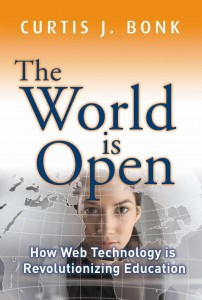The World is Open
- On 03-08-2010
I promised a week ago to point to a range of useful websites that one of the keynote speakers recommended and here it is!
At the NSW Conference on Engaging Learners Through Innovative Practice one of the keynote speakers was Dr Curtis Bonk (you can follow his blog here http://travelinedman.blogspot.com/). He spoke about the wide range of internet resources that are now available to motivate and engage learners.
Curtis generously sent me his new book The World is Open which expands on his talk about how the web is revolutionising education.
The main thrust of the book and Curtis’s talk is that technology and the availability of information and resources is now at the point that
“Anyone can now learn anything from anyone at anytime”
Let me quote some sections from the text”
“… Thomas Friedman argued that our world had been flattened by many technologies, most significant of which is the Internet, with its ability to find nearly any piece of information we might seek in the exact moment of need. As he showed, the commerce-related implications of this premise are enormous”
“In the twenty-first century, education trumps the economy as the key card to participation in the world. It is education, after all, from which robust economies are built.”
“We are living in a time period of the most monumental changes and challenges to arise in education since Plato held his first classes at his famed academy, Hekademeia, later known as Akademeia. Even in those days, learning in different locations and times was facilitated by technology as teachers and learners were shifted from exclusive reliance on oral traditions to instruction that included the written word. This, of course, was a historic transformation for the people of the planet because learning could now take place beyond a singular geographic location and moment in time.”
Curtis goes on to not only point to how we are now at a similar transformational period in human history but gives a range of examples. Here are some resources for you!
1. Notschool.net: is an international ‘online learning community’ offering an alternative to traditional education for young people who are unable to engage with school or other complementary provisions such as home tutoring or specialist units.
2. CALM Chemistry: a free web tool to assist learning chemistry
3. Jing: A simple way to add visuals to your online conversations. Teachers can use it to explain processes online.
4. WolframAlpha: a computational knowledge engine that is quite remarkable! It gives you access to an extraorindary range of facts about anything in the world.
5. Geothentic: Geospatial technologies plus Authentic Learning. Geothentic provides an online environment for teachers and students to solve complex geography circumstances. Brilliant!
6. Nautilus Live: Follow along as Dr. Robert Ballard and his team undertake an exciting expedition on the E/V Nautilus to map the sea floor and study underwater volcanoes. Be there in real time.
7. Virtual Tours of the Louvre: go for a tour through the museum (many museum sites have these functions now!)
8. Turning the Pages: turn the pages of historical documents in the British Museum
9. ARCHAVE: the ARCHAVE system is an immersive virtual reality environment for archaeological research.
and many more. Check out more by downloading Curtis’s presentation here sydneykeynote – curtis bonk.
Two items I want to end on:
1. While the technology and resources are here to make classrooms more engaging and have the students drive their own learning, few teachers take it on. This article shows some research into this (Research-dispels-common-ed-tech-myths).
2. Third world countries are becoming the source of innovation that will drive the future. Don’t believe me? India has come up with a $35 tablet computer that they hope will be used throughout their school system. (India unveils $35 tablet computer) And we complain about getting netbooks in schools and politicians are trying to end the computer in schools program!
What great websites for learning do you know of and would like me to speak about?

0 Comments